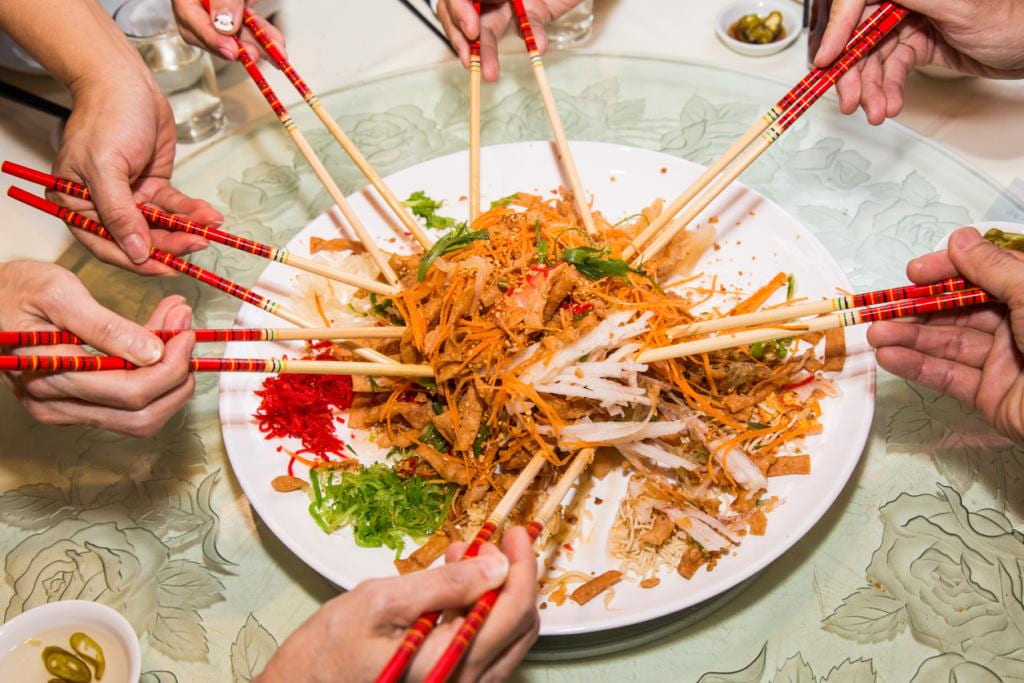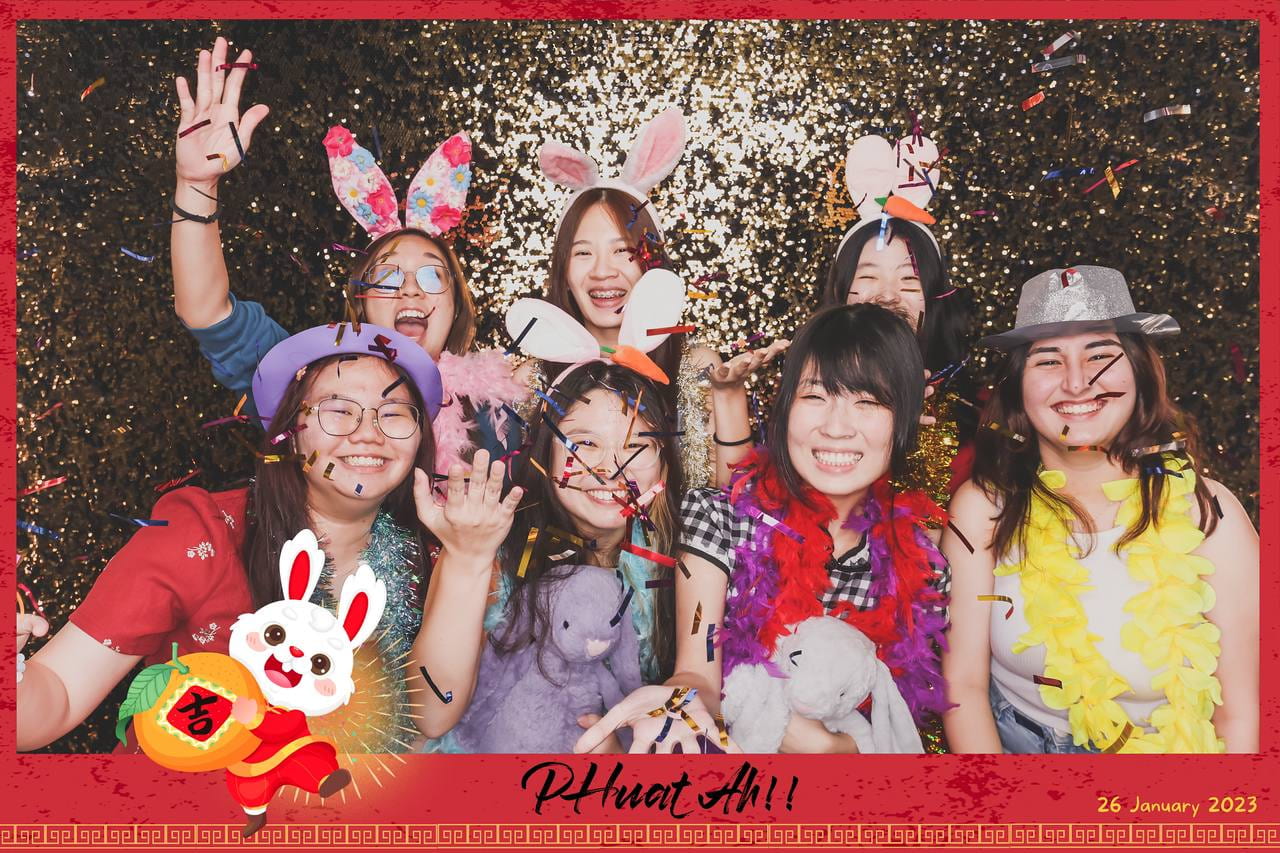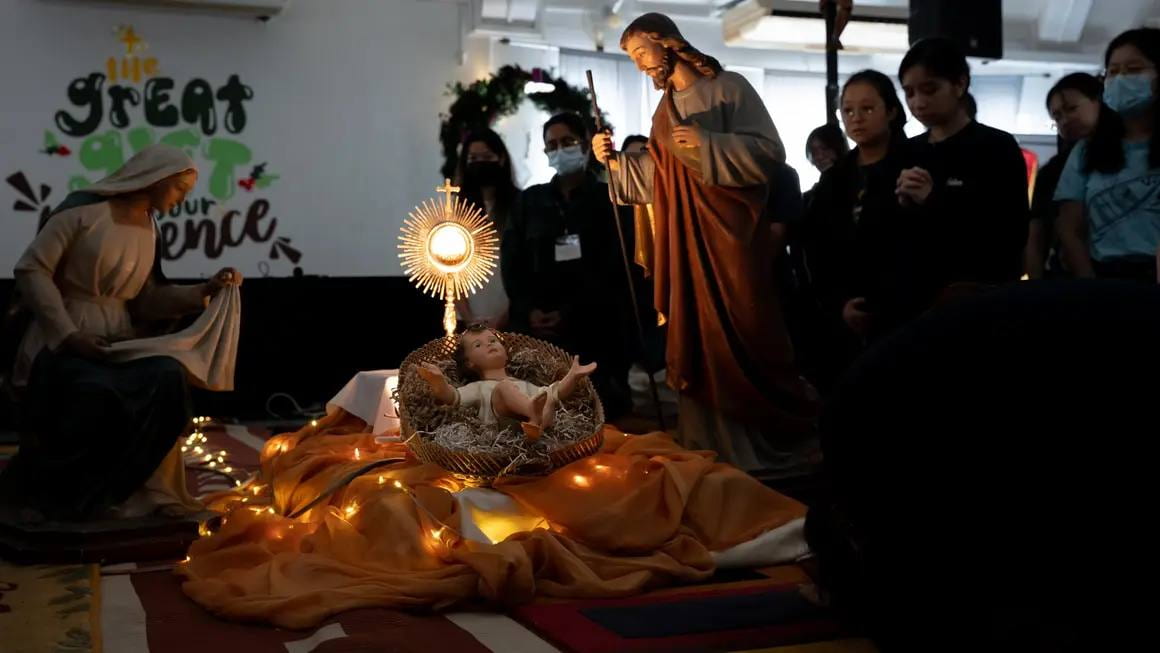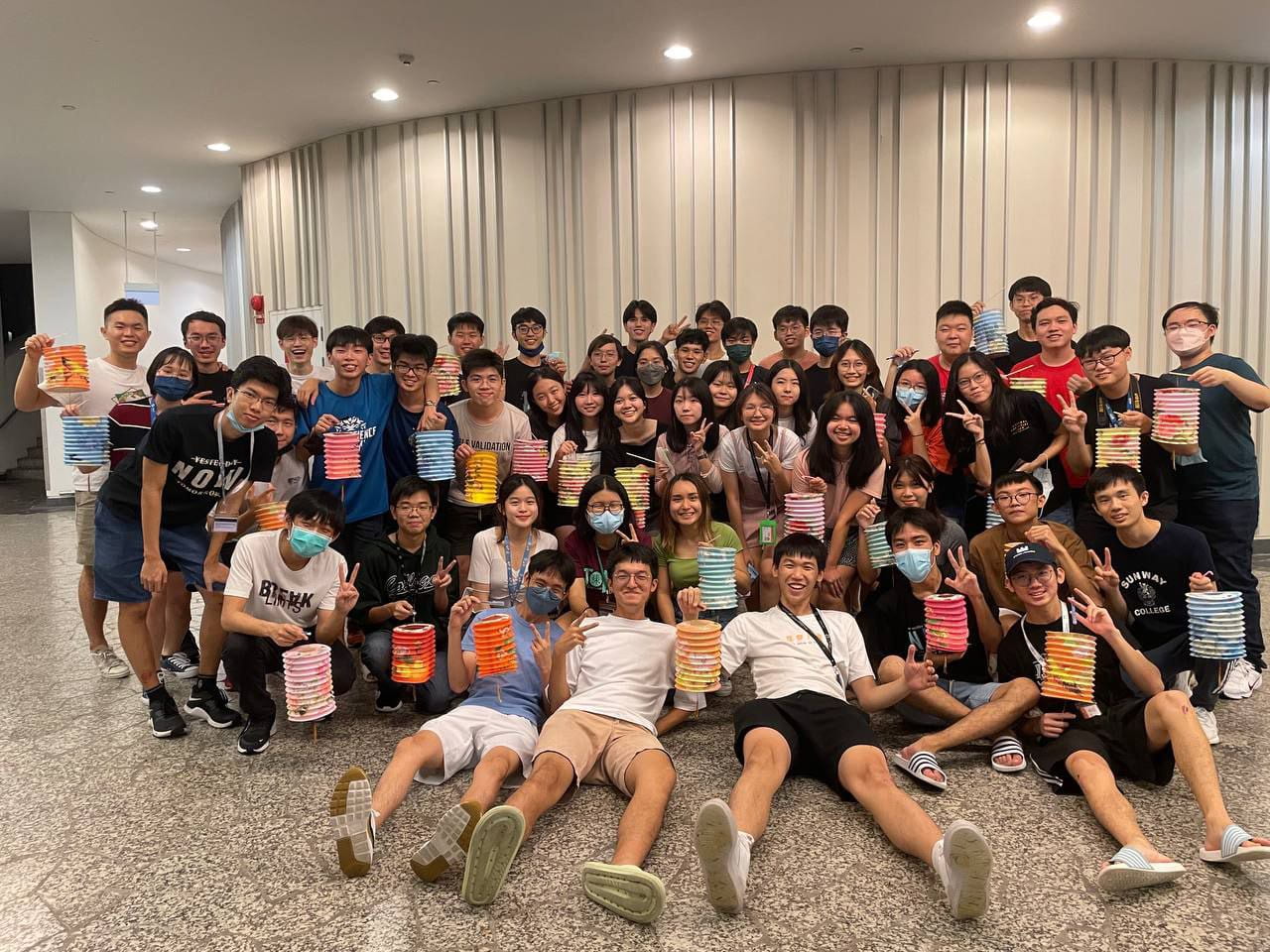Festivals are joyous celebrations that bring families and loved ones together, creating moments of joy and warmth marked by shared food, laughter, and cherished memories. These festive occasions offer a respite from our fast-paced lives and are meaningful opportunities for reflection and celebration.
At NUS, our student community is vibrant and diverse, with students hailing from different parts of the world, practicing different cultures and following different faiths. Keep reading to find out how various festivals are celebrated here at the National University of Singapore!
Chinese New Year
Chinese New Year, as the name suggests, marks the beginning of a new year in the Chinese calendar. The new year celebrations are symbolic of welcoming the new and the good and a time of gathering and reuniting with family and friends.
Claressa Beh (Y3, Psychology) stays in Pioneer House and is part of the Student Council. “At Pioneer House, we welcome Chinese New Year with a big annual party,” she shared. Last year, the event showcased a Lion Dance, which is believed to bring good luck and prosperity into the coming year. Another highlight of the event was Lo Hei, a tradition where members of the community come together and toss yusheng, a dish made of fish slices, shredded vegetables, and other condiments. The event attracts many residents and is an opportunity for attendees to make new friends and learn about Chinese culture.
Lo Hei (Image credits: Singapore Motherhood)
Chinese New Year is celebrated by Chinese families across Singapore and is a much-awaited public holiday. “On the day of Chinese New Year, we have a family reunion dinner at home,” Claressa continued, “I help my mom cook Chinese and Nonya dishes for the dinner spread.”
Of course, one cannot skip mention of ang pao or more familiarly known as “the red packets” while mentioning Chinese New Year. The elders in the family will give out money as gifts to the younger generation in red packets to pass on a year of good fortune. “For students like me, red packets are a great way to earn some extra pocket money,” Claressa laughed.
Claressa and her floormates at Pioneer House posing for a photo at last year’s Chinese New Year event – PHuat Ah!! – organised by Pioneer House. (Bottom row, second from right: Claressa)
For her, the best part about Chinese New Year is spending time with her family. “Because I stay in dorm [Pioneer House], I don’t go home so often and I look forward to the family getting together on the day of Chinese New Year!”
Here’s a fun fact for our readers as Chinese New Year 2024 is coming up soon: 2024 is the Year of the Dragon! Find out more about Chinese zodiac animals and their significance here.
Christmas
Tis the season to be jolly, Fa la la la la, la la la la. Whether you celebrate Christmas or not, Christmas carols are familiar to everyone. Christmas is celebrated globally amongst the Christian community to mark the birth of Jesus Christ. It is celebrated with a lot of joy here in Singapore too.
“For me, Christmas is important because of the message that it shares. It’s amazing to me that God would choose to be born into our world in a humble manger,” Mark Yeo (Y4, Physics) from the NUS Catholic Students’ Society shared with us. Students from the Catholic Students’ Society take part in a four-day long Christmas Retreat hosted by the Office of Young People, a Catholic body that oversees Catholic youths in Singapore. During the retreat, apart from attending mass (an important worship service) and different prayer activities, students also share their stories to inspire hope in others. “And of course, we have the usual joyous carolling and fellowship too!” Mark added.
From one of the prayer sessions at the Christmas retreat.
On Christmas Eve, Mark and his family attends the Christmas Vigil Mass at church. “It’s a pretty big celebration as everyone anticipates Christmas. There will be a lot of candles, long processions, and longer prayers,” he explained. The day of Christmas is spent catching up with family and loved ones. “There will be good food, you know: turkey, chicken, log cakes,” Mark continued, “we sometimes set up games for the younger ones too!” His favourite part about Christmas is the time spent with family, “I have a big extended family and the day really is about bringing joy to one another.”
After Christmas, the Catholic community in NUS get together for a Christmas party.
Deepavali
Deepavali or Diwali, is the Hindu festival of lights. Depending on family backgrounds, the mythology behind the festival of Deepavali differs. But the common thread is that Deepavali celebrates the victory of good over evil, light over darkness.
Hailing from the city of Kolkata in India, Ishita Mandal (Y3, Computer Engineering) moved to Singapore in 2022 to pursue her undergraduate degree in NUS. Back home in India, Deepavali was a much-celebrated festival for Ishita and her family. A few days before the festival, Ishita would take initiative to decorate the whole house in lights and diyas, a traditional oil lamp. On the day of the celebration, she would meticulously draw a rangoli outside the front door to her house. Ishita reminisced, “I would google rangoli designs for Diwali months before. On the day, I would spend a good 2-3 hours drawing out the design with chalk meticulously and filling it with colours.” In the evening, the family would take part in a puja (worship ritual) dedicated to Goddess Kali. The day ends off with a bang – quite literally. “My cousins and I will go up to the terrace and bust firecrackers. I’ve stopped doing it for the past 5-6 years now because of pollution but it is still a fond memory,” Ishita smiled.
Rangoli is an Indian art form in which intricate designs are drawn on the floor using coloured powder, flower petals, and puffed rice. Here Ishita is placing diyas (oil lamps) in her rangoli!
Deepavali in Singapore looks a little different for Ishita. Last Deepavali, she attended the event hosted by Prince George’s Park Residence (PGPR), where she stays. “There was good Indian food and music. It was good to be amongst others and know you are celebrating something together,” she shared. While she misses putting up lights and decorating her house, she looks forward to other aspects of Deepavali now that she’s away from home. “In Singapore, during Diwali, I especially look forward to good Indian food. I love to dress up in Indian clothes, wear Indian jewellery and spend the day celebrating my culture!”
Diyas are traditional oil lamps. They come in various shapes and colours! (Image credits: Medium)
Hari Raya
Muslims around the world have two celebrations every year: Eidul Fitr and Eidul Adha or locally known as Hari Raya Puasa and Hari Raya Haji respectively. Hari Raya Puasa is celebrated at the end of a month-long fasting period and Hari Raya Haji is celebrated during the Muslim pilgrimage called hajj. Both occasions are important days for Muslims and welcomed with much joy.
Rasyidah Binti Mudzzaffar (Y3, Life Sciences) is the NUS Muslim Society’s curent Vice President. “Last year, for Hari Raya Puasa, we organised an event with the NUS Malay Language Society at Ridge View Residential College. The event showcased traditional Malay/Muslim performances,” she noted. The event was open to both Muslims and non-Muslims. But that’s not all. While there is only one official event, each ad-hoc group under the NUS Muslim Society will conduct their own raya gatherings. Each committee will travel together to a few of the member’s houses. “We will visit the houses that people volunteer to open for us. It’s a full day affair!” Rasyidah elaborated, “This carries on throughout the month.”
Rasyidah and the NUS Silat team after their performance at the raya event – Raya with Ridge – last year. The event also featured performances from NUS Dikir Barat and NUS Ilsa Tari. (Bottom row, first from left: Rasyidah)
Rasyidah spends the day of the raya at home with her family. After attending morning raya prayers at the mosque, she will help her mother in putting together a delectable meal. “A few days before raya, I help to weave ketupat. Then on the day, we will have it with other dishes like ayam lemak cili padi, sambal goreng, and of course, rendang is a must!” The rest of the day is spent visiting relatives and exchanging raya greetings. “The family is always getting bigger and there are new people to meet.” Rasyidah added with a chuckle, “Also the more houses you visit, the more green packets (ie. raya money) you get.”
A raya open house gathering of NUS Muslim Society’s Overseas Community Project (OCIP) ad-hoc committee.
Mid-Autumn Festival
The Mooncake Festival or the Mid-Autumn Festival is celebrated on the 15th day of the 8th lunar month. The celebration traces its origin back to the Zhou Dynasty, where Chinese emperors are believed to have worshipped the moon in autumn in order to seek a successful harvest the next year. There are many stories behind the festival, some of which you can find here.
For Lee Wei Da (Y2, Pharmacy), an international student from Malaysia, Mid-Autumn Festival is celebrated with fellow students as part of celebrations organised by the NUS chapter of AMCISA (Association of Malaysian Chinese Independent School Alumni). “We gather at UTown in the evening to play games and share mooncakes,” Wei Da told us. Last year, he also helped out at the Mid-Autumn Festival organised by PGPR. The event featured a pomelo peeling competition, a lantern painting station, a photo booth, and lots and lots of mooncakes. “It was nice to see people come down and celebrate the festival together,” Wei Da recalled.
Attendees holding up lanterns at the Mid-Autumn Festival celebration conducted by AMCISA last year.
In Malaysia, Wei Da’s family celebrated the Mid-Autumn Festival by coming together at nighttime to watch the moon, eat pomelos and mooncakes, and hang lanterns around the house. “We would even carry lanterns and walk around the neighbourhood. It was a lot of fun and I miss it dearly,” Wei Da said.
The Mid-Autumn Festival event at PGPR held in September 2023 attracted not only Chinese residents, but others who were experiencing the festival for the first time. The event even featured staff members who sang some favourites.
Celebrations bring together people in a way nothing else can. Good food, great company, and laughter: what else does one need? What other festivals do you celebrate? Let us know below 😊.









